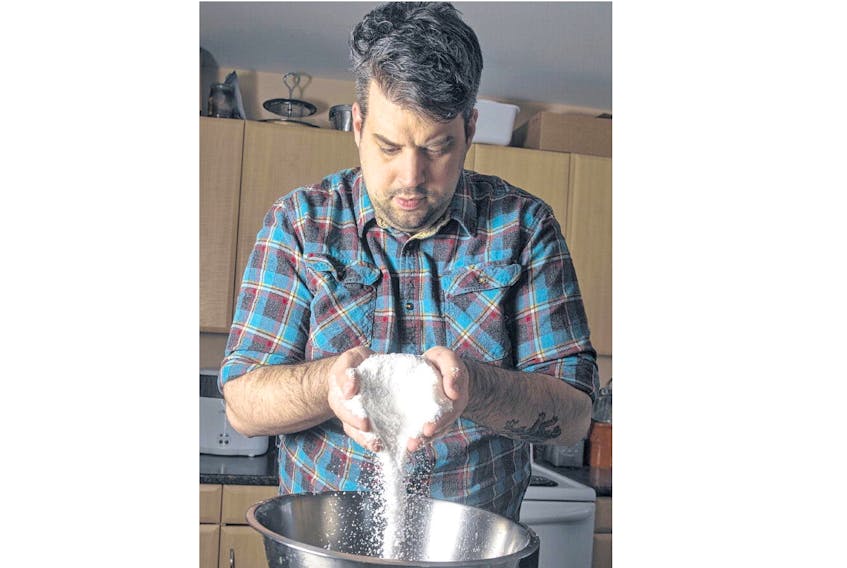As a paludier, Colin Duggan is unlikely to meet someone at a party who has the same job he does.
“A paludier is a traditional term for someone who makes sea salt, fleur de sel,” says Duggan. “I feel like if we were in France, it’s not the fanciest of terms, the paludiers would be the guys on the salt flats in bare feet with the rakes. But here it sounds super fancy, and it is technically what I am.”
Duggan and his wife Audrey started their business, Tidal Salt, a year and a half ago with not much more than a bucket. By March of 2017, they were selling varieties of salt through their web site and at farmers markets, and were busy right away — at work and at home.
“When you start a business, you should also have a baby at the exact same time,” Duggan said. Thenthey were featured on TV and in Chatelaine magazine’s holiday gift guide and business really took off. “That got us thinking that there was something more to it than just a farmers’ market type of business.”
But the Duggans want to take the move into retail slowly. Colin still works a full-time job at Dalhousie University, and they’ve been able to operate Tidal Salt on a debt-free basis while shipping $20 gift boxes of salt all over North America and to the U.K. He figures if he worked at it full-time, he could triple production.
“Family comes first, so we’re holding off on the big stores like Sobey’s and (Superstore) until we can get a handle on living with a baby at the same time. It’s easily scalable, so right now we’re perfecting our process. We make about four kilograms a week, which is not a lot,” he said. “We’re selling as much as we can make, but we’ve been taking a break from the farmers market since the end of the Christmas season. We’ve been building up our inventory to move into retail.”
The company has an offer from Pete’s, and shops in Montreal, Toronto and Ottawa have asked to stock its products. Duggan says he wants to control growth while looking for a seasoned investor to help Tidal Salt grow.
“We’re always keeping our ear open for someonewho can bring some expertise to what we’re doing. Once we make that jump into the stores, I want to do so with a lot of confidence and with a good structure beneath us,” he said. “We’ll go into Pete’s once we can meet demand. The last thing I want to do is sign up to sell something, create an expectation and then not be able to meet it.”
It takes 140-150 litres of water to make four kilograms of salt, and while the raw ingredient is priced right, Duggan is constantly on the search for a better beach.
“I’m trying to focus on making our product as pure as possible. Sea salt is not going to be a hundredper cent sodium chloride,
very different area will have its own percentage.The first time I made it I happened to be atLawrencetown, and I just happened to have a bucket so I took some water and made sea salt from it. About a week later I went to Cow Bay and tried there, and then I tried Rainbow Haven and those three salts were very different,” said Duggan, who is now using a location in Eastern Passage, not too far from the family home in Dartmouth, but good and far from Halifax harbour.
He collects at high tide, trying for water that comes from depth.
An experiment with water from the Bay of Fundy resulted in a salt that was brown from the bay’s silt;delicious but unattractive.
“One of the things we’re looking for is the presenceof shellfish, because shellfish will naturally filter a lot of the water,” said Duggan, who tests every batch of salt for, as funny as it sounds, salinity. “I don’t have an engineering degree, but I built the process that we make the salt with . . . and it was just trial and error. It took me a while to get it just right.”









